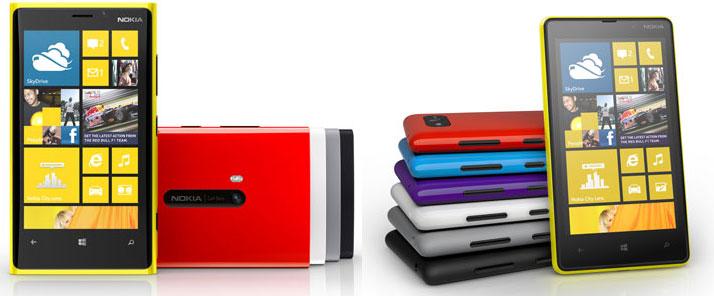Nokia to target emerging markets with new inexpensive Lumia
While rumors persist that Apple is planning to launch a low-cost iPhone, Nokia is set to unveil its own inexpensive handset at next week's Mobile World Congress.
In addition to a lower-priced version of its Lumia smartphones series running Windows Phone 8, Nokia is also set to launch a basic phone that will compete with budget players like Huawei and ZTE, which are popular in China. The models will be unveiled in Barcelona next week at the Mobile World Congress industry show, according to Reuters, which cited unnamed company sources.
Nokia's Lumia 920 (left) and Lumia 820 (right).
Just how much cheaper the new Nokia Lumia handsets will be remains to be seen. The company's current flagship device, the Lumia 920, is available through AT&T for $99.99 with a new two-year service contract, or $100 less than Apple's least expensive iPhone 5 model.
AT&T also caries Nokia's current low-end Lumia 820 for $49.99, while the company's previous-generation Lumia 900 is available for 99 cents with a new contract.
Nokia's apparent interest in the low-end market comes as Apple is rumored to be working on its own less expensive iPhone model designed for emerging markets like China and Brazil. On Friday, analyst Katy Huberty with Morgan Stanley expressed increased confidence that Apple will release a cheaper "iPhone mini" to continue its growth.
An estimated 65 percent of the current smartphone market is driven by inexpensive handsets that are purchased by customers who do not want to be locked in to a two-year service contract. While Apple competes in the $400-and-up high-end market, it's estimated that most sales — 580 million — come in below that price point.
Currently, Apple's cheapest iPhone without a contract is the iPhone 4, which is available for $450 in the U.S. But local taxes increase the price to $490 in China, and $750 in Brazil.
Nokia's Lumia 920 also costs more than $600 without a carrier contract in the U.S., as well as some European markets.
 Sam Oliver
Sam Oliver











 Mike Wuerthele
Mike Wuerthele
 Malcolm Owen
Malcolm Owen
 Chip Loder
Chip Loder

 William Gallagher
William Gallagher
 Christine McKee
Christine McKee
 Michael Stroup
Michael Stroup
 William Gallagher and Mike Wuerthele
William Gallagher and Mike Wuerthele






